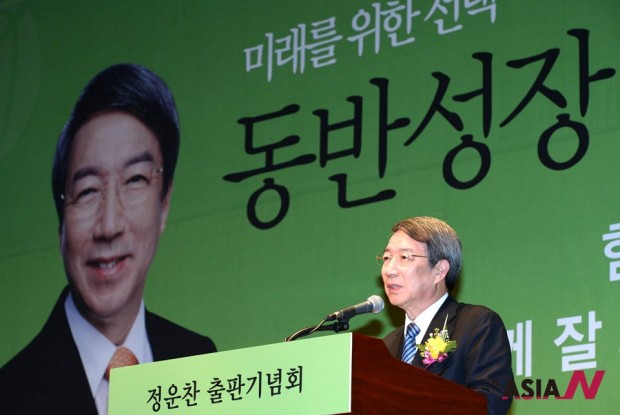Shared Growth, a Beauty of Growing Together

Mr. Chung Un-chan speaks at the party in celebration of his book <Shared Growth: A Choice for the Future> held in Seoul, South Korea on February 5. (Photo: NEWSIS)
Professor Chung Un-chan’s usual words of toast is “Dongban(meaning sharing).” In response, the audience calls out “Seongjang(meaning growth).” ‘Shared growth’ has been a consistent theme for his life since the former South Korean Prime Minister and President of Seoul National University became the first head of the Commission on Shared Growth for Large and Small Companies. Economists, historians and smaller business entrepreneurs in the future might define shared growth which is newly conceptualized in the early 21th century as this:
“Win-win ideas for growing together of big corporations and smaller ones initiated by SNU President Chung Un-chan, bundling up his forty year’s economic research despite all kind of criticisms, who was once nominated for the South Korean presidency by the liberal political powers, but was appointed Prime Minister by conservative President Lee Myung-bak.”
Mr. Chung’s recently published book <Shared Growth: A Choice for the Future> inexorably pours out what he has thought and acted for current and future alternatives. He says “we can reach further as long as we go together.” Shared growth is the first step toward a beautiful accompanied journey as it literally means “growing together.”
He became Chairperson of Shared Growth Institute established in June, 2012 after serving for 16 month as head of the Commission on Shared Growth for Large and Small Companies. Regarding the process, he tells in the book “I had to stand up to powerful chaebol all by myself because shared growth requires a radical change of chaebol’s mindset. I’d like to dedicate this book to small and medium-sized company enterprisers, small business operators and their family members.”
He raised his voices in sharp criticism of so called ‘economic democratization’ brought forward at the last presidential campaign by the ruling and the opposition parties’ candidates. “Ruling Saenuri Party’s economic democratization has limited implications that force big conglomerates to abide by fair trade rules in maintaining the status quo of present relationship between big corporations and smaller ones. It would be tantamount to saying that flyweight and heavyweight boxers fight each other on the ring regardless of weight limits. Isn’t it fair to tell them “Fight fair! Don’t kick! Don’t offend rules,” said Mr. Chung.
“Liberal Party’s economic democratization sounds like laying a hand on chaebol. The intention to reform chaebol is definite while the roadmap to reach the goal is still impalpable. Our objective is not just the reformation of chaebol, but a wholistic economic democratization through shared growth. We hope for us all to be well off together, not to make rich people poor.
He emphasized that shared growth should not be limited to the economic area. He gave an example of a shared growth model, which is the ‘regional balancing selection system’ introduced in 2005 when he was SNU President. In this system, the number of high schools that produced more than one successful applicant went up to 1,000 from 700. What underlies the idea is that indirect experiences through the exchange of varied regions, environments and dispositions enrich students’ creativity.
There’s another example. Gaeseong Industrial Complex set up in cooperation of South and North Koreas could be a good model of shared growth. Mr. Chung believes that Gaeseong Industrial Complex could not only a good opportunity to invigorate small and medium-sized companies, but also a clue to productive reciprocality by alleviating conflicts between the South and North. In this sense, many Koreans visiting the Great Wall of China and many Chinese visiting Jeju Island can be one way of shared growth. Charity activities and donation from affluent people like Warren Buffet, Bill Gates and the famous rich family Choi of Gyeongju are a part of shared growth. And gold raising campaign under Kim Dae-jung government is the same.
Mr. Chung who gave 40 years’ of his life to economic study at the university tells students as follows. “Crying out against raising the tuition fees might be an immediate concern. But at the same time student need to look into the fundamental causes for why so many students have to go to college repeatedly on and off bases, why they take up the burden of ‘880 thousands won’ generation without decent jobs, why households debt is continuously on the rise. That’s how we find out a key to solve the problem.”
I would like to share with our readers two inspiring quotes from his book.
“I can do what you can’t do and you can do what I can’t do. Together we can do something beautiful for God.” (Mother Teresa)
“If you have an apple and I have an apple and we exchange these apples then you and I will still each have one apple. But if you have an idea and I have an idea and we exchange these ideas, then each of us will have two ideas.” (George Bernard Shaw)

























































